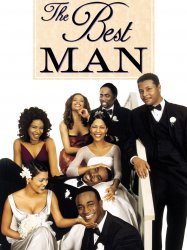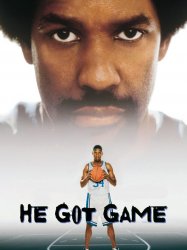40 Acres & A Mule Filmworks

If you like this company, let us know!
40 Acres and a Mule Filmworks is the production company of noted American filmmaker Spike Lee.
The company is named after a famous episode of early Reconstruction. In 1865, General Sherman issued "Special Field Order 15", which ordered the distribution of lots of 40 acres (160,000 m) to some freed black families on the Georgia coast, and also distributed some surplus army mules. After President Lincoln was assassinated, President Andrew Johnson revoked the order, took the land away from the freed slaves, and returned it to the previous owners.
After the success of films such as Do The Right Thing and Malcolm X, Lee expanded the 40 Acres brand by opening small clothing stores with merchandise that bore the 40 Acres emblem. Lee has also done several collaborations with clothing companies such as Nike, Eckō and Brooklyn Denim.
40 Acres and a Mule Filmworks also has an advertising division with DDB called Spike DDB located in New York. They have done several famous Super Bowl, Nike and Lay's potato chip commercial spots. They have produced hundreds of commercials and music videos in addition to Lee's famous films.
In 2004, 40 Acres and a Mule Filmworks moved all of its operations to New York City with headquarters in Spike Lee's native borough of Brooklyn. 40 Acres and a Mule Filmworks headquarters is located on South Elliott Place in the Fort Greene neighborhood of Brooklyn.
The production company won a Peabody Award in 2010 for If God Is Willing and Da Creek Don't Rise.
Best films
Filmography of 40 Acres & A Mule Filmworks (39 films)
Production

Da 5 Bloods (2020)
Directed by Spike Lee
Origin USA
Genres Drama, War, Action, Adventure
Themes Politique, Political films
Actors Chadwick Boseman, Delroy Lindo, Jean Reno, Jasper Pääkkönen, Giancarlo Esposito, Isiah Whitlock, Jr.
Quatre vétérans Afro-Américains de la guerre du Viêt Nam retournent dans la jungle du Viêt Nam des années plus tard. Ils veulent y retrouver un trésor enfoui et le corps de leur chef d'unité. Sur place, ils vont par ailleurs se rendre compte des ravages causés par la guerre.
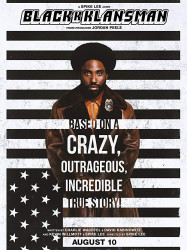
BlacKkKlansman (2018)
, 2h15Directed by Spike Lee
Origin USA
Genres Drama, Thriller, Comedy, Historical, Crime
Themes Films about racism
Actors Adam Driver, John David Washington, Corey Hawkins, Topher Grace, Laura Harrier, Danny Hoch
Le film commence par un extrait de Autant en emporte le vent, montrant les ravages de la guerre de Sécession durant le siège d'Atlanta. Le Dr Kennebrew Beauregard présente ensuite la rhétorique raciste sudiste.

Touched with Fire (2016)
Origin USA
Genres Drama, Romance
Themes Medical-themed films, Films about psychiatry
Actors Katie Holmes, Luke Kirby, Christine Lahti, Griffin Dunne, Bruce Altman, Annie Golden
Deux maniaco-dépressifs se rencontrent dans un hôpital psychiatrique et commencent une histoire d'amour qui révèle toute la beauté et l'horreur de leur condition.

Chi-Raq (2016)
, 1h58Directed by Spike Lee
Origin USA
Genres Drama, Comedy, Musical theatre, Musical, Crime
Themes Théâtre, Musical films, Films based on plays
Actors John Cusack, Nicholas Cannon, Jennifer Hudson, Jeremy Piven, Samuel L. Jackson, Common
Après la mort d'un enfant tuée par une « balle perdue », un groupe de femmes mené par Lysistrata s'organise contre la violence dans les quartiers de South Side à Chicago.
 , 1h33
, 1h33Directed by Spike Lee
Origin USA
Genres Documentary, Musical
Themes Documentaire sur une personnalité
Actors Michael Jackson, Quincy Jones, Rosie Perez, David Byrne, Lee Daniels, Spike Lee
Ce documentaire relate l'ascension du roi de la pop, Michael Jackson, à travers la création de son album solo historique, Off the Wall.

Da Sweet Blood of Jesus (2015)
, 2h3Directed by Spike Lee
Origin USA
Genres Drama, Thriller, Comedy, Horror comedy, Romantic comedy, Horror, Romance
Themes Films about sexuality, Comedy horror films, LGBT-related film, Lesbian-related films
Actors Michael K.Williams, Felicia Pearson, Zaraah Abrahams, Joie Lee, Cinqué Lee, Rami Malek
The film opens with an unnamed dancer (Charles “Lil Buck” Riley) dancing in various locations around Brooklyn during the credit sequence.

Oldboy (2013)
, 1h44Directed by Spike Lee
Origin USA
Genres Drama, Thriller, Action, Crime
Themes Films about families, Films about sexuality
Actors Josh Brolin, Elizabeth Olsen, Sharlto Copley, Samuel L. Jackson, Richard Portnow, Michael Imperioli
In 1993, Joe Doucett (Josh Brolin) is an alcoholic advertising executive for his company. His constant drinking has gotten him into frequent trouble at work, and one day his ex-wife Donna berates him for missing his daughter, Mia's 3rd birthday, which he brushes off. Later that night, he ruins a meeting with a highly potential client, Daniel Newcombe (Lance Reddick), by hitting on his girlfriend. Knowing that he will likely be fired for his failure, Joe gets drunk, and goes to a bar owned by his friend Chucky (Michael Imperioli), who refuses him entry. While stuck outside, he spots a woman with a yellow umbrella, before passing out.

The Best Man Holiday (2013)
, 2h3Directed by Malcolm D. Lee
Origin USA
Genres Comedy
Themes Christmas films
Actors Terrence Howard, Harold Perrineau, Jr., Nia Long, Morris Chestnut, Taye Diggs, Sanaa Lathan
Mia Sullivan (Monica Calhoun), wife of Lance Sullivan (Morris Chestnut), has written letters requesting the old gang join them for Christmas: Harper Stewart (Taye Diggs) and his almost-nine-month-pregnant wife Robyn (Sanaa Lathan), Julian Murch (Harold Perrineau) and wife Candace Sparks (Regina Hall), her best friend Jordan Armstrong (Nia Long) and boyfriend Brian McDonald (Eddie Cibrian), Quentin "Q" Spivey (Terrence Howard), and Shelby Taylor (Melissa De Sousa). All the friends arrive at the house, the first time they've come together in 14 years, and the celebration begins. At dinner, the old friends catch up while tensions grow between Shelby and Candace.
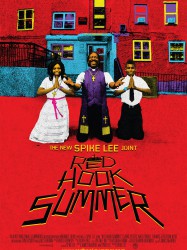
Red Hook Summer (2012)
, 2h1Directed by Spike Lee
Origin USA
Genres Drama, Comedy-drama
Themes Films about music and musicians, Hip hop films, Gangster films
Actors Clarke Peters, Nate Parker, Thomas Jefferson Byrd, Colman Domingo, Heather Simms, James Ransone
Flik Royale is a 13-year-old boy from Atlanta who is sent to live with his preacher grandfather, Da Good Bishop Enoch Rouse, in Red Hook, Brooklyn.

Bad 25 (2012)
, 2h3Directed by Spike Lee
Origin USA
Genres Documentary, Musical
Themes Films about music and musicians, Documentary films about music and musicians, Documentaire sur une personnalité, Musical films
Actors Michael Jackson, Spike Lee, Mariah Carey, Rubén Blades, Glen Ballard, Sheryl Crow
The film includes behind the scenes clips of the recording session of Jackson's seventh studio album, Bad. It also features various people that had worked with Jackson during the Bad era (1986–1989) talking about the production of the album and the tour, acting or starring in some of Jackson's Bad singles and music videos including Sheryl Crow who was the duet partner with Jackson on the Bad World Tour for "I Just Can't Stop Loving You", Siedah Garrett, the original duet artist, talks about her experience with Jackson and many others. There are also interviews with influenced entertainers and artists.
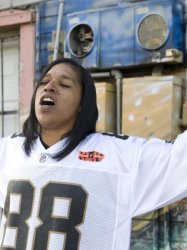 , 4h15
, 4h15Directed by Spike Lee
Origin USA
Genres Documentary
Themes Documentary films about historical events, Documentary films about cities, Disaster films
Actors Terence Blanchard, Sean Penn, Wendell Pierce, Brad Pitt
Featured in the documentary are stories about New Orleans' rebuilding efforts in the aftermath of Hurricane Katrina, including the shuttering and demolition of four public housing projects in the city. The documentary also goes into the story of how the Federal Bureau of Investigation looked into allegations of brutality and cover-ups within the New Orleans Police Department.
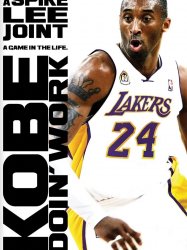
Kobe Doin' Work (2009)
, 1h23Directed by Spike Lee
Origin USA
Genres Documentary
Themes Sports films, Basketball films, Documentary films about sports, Documentaire sur une personnalité
Actors Kareem Abdul-Jabbar, Spike Lee
Kobe Doin’ Work is an 84-minute exploration of Kobe Bryant’s work ethic, his in game mentality, and his bluntness that makes Kobe a great competitor. [1] It focuses on Kobe Bryant during one day of the 2007–08 Los Angeles Lakers season. Bryant granted filmmaker Spike Lee and 30 cameras unprecedented access to his life for one day. Kobe: Doin' Work premiered on ESPN on May 16, 2009.The documentary follows Kobe Bryant during the 2007–08 NBA season throughout the April 13, 2008 game against the San Antonio Spurs.[2] The game in which Kobe was documented and given a microphone to capture live in game moments was a heated game with the rival Spurs. Kobe shot 6 of 14 from the field, scored 20 points, and played 32 minutes. The game was a crucial game in the end of the regular season, as the Los Angeles Lakers hoped to keep first place in the Western Conference with a record of 55-25. Spike Lee was interviewed asking why he chose Kobe Bryant to direct this documentary, in which Lee replied, "I'm a big basketball fan. It was obvious. He was having an MVP-type year, in which he did win the MVP. Also the Lakers looked like they were going to take it to the Finals. And I wanted them to beat the Celtics. I hate the Celtics. But the Celtics won. But I don't think I was taking a gamble by choosing Kobe." (Lee, NBA.com)3. Kobe agreed to let Lee microphone him during the game, in which he also played in the game. According to Spike Lee, "He (Kobe) said several times how much fun it was just doing it." (Lee, NBA.com)3. The 83-minute documentary ran on ESPN commercial free.[3] The documentary also focuses on Bryant and the team in huddles and during time-outs. The cameras also get full access of coach Phil Jackson in the locker room with the team during half-time.[4] Bryant provided the voiceover for the documentary on February 2, 2009, hours after he scored 61 points against the New York Knicks at Madison Square Garden, (then a single-game record at the arena, which has been broken since).[5] Spike Lee said that he was excited for Kobe to do the commentary following a game at Madison Square Garden, but no one expected a 61-point performance from Bryant. "I know that if he had a terrible game the commentary would not have been the same. Guaranteed. But Kobe said he made a point to make sure not to lose the game or he would hear it from me." (Lee, 8th paragraph)3. Kobe indeed said in an after game interview that he was going to give the game his all in order to show Spike Lee a thing or two about Bryant’s skills on the court against the Knicks. "On a lighter note, I'm going to review this documentary I'm doing with Spike Lee tonight after the game and I didn't feel like sitting next to him and hearing him talking trash about the Knicks, so that was added incentive as well. Seriously. He's going to get an earful tonight." (Bryant, 8th paragraph, ESPN.

Miracle at St. Anna (2008)
, 2h40Directed by Spike Lee
Origin USA
Genres Drama, War, Thriller, Action, Historical, Crime
Themes Political films
Actors Derek Luke, Michael Ealy, Laz Alonso, Omar Benson Miller, Valentina Cervi, John Turturro
In 1983, Hector Negron, an aged Puerto Rican World War II veteran, works as a post office clerk in New York City. After recognizing a customer, Negron shoots and kills the man with a German Luger pistol. Several hours later, reporter Tim Boyle and Detective Tony Ricci are at the crime scene seeking information. At Negron's apartment, Boyle, Ricci and other officers discover a finely carved statue head, the Head of the Primavera, a long missing segment from the Ponte Santa Trinita. Also found is a Purple Heart and a photograph revealing that Negron was awarded the Distinguished Service Cross and Silver Star.

Inside Man (2006)
, 2h9Directed by Spike Lee
Origin USA
Genres Drama, Thriller, Crime
Themes Heist films, Gangster films, Escroquerie
Actors Denzel Washington, Clive Owen, Jodie Foster, Christopher Plummer, Willem Dafoe, Chiwetel Ejiofor
Dalton Russell (Clive Owen), seated in what appears to be a jail cell, opens the film with a prologue about having carried out the "perfect robbery". A van is driving from Brooklyn to the Wall Street area. Inside is a team of masked robbers, dressed as painters, who call each other by variants of the name "Steve" (i.e. Steve, Stevie, Stevo). They seize control of a Manhattan bank and take the employees and patrons hostage. They divide the hostages into groups and hold them in different rooms, forcing them to strip and don painters' clothes identical to their own. The robbers rotate the hostages between various rooms and occasionally insert themselves covertly into the groups, while also taking turns working on an unspecified project involving demolishing the floor in one of the bank's storage rooms.
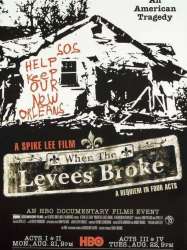
When the Levees Broke (2006)
, 4h15Directed by Spike Lee
Origin USA
Genres Documentary
Themes Documentary films about historical events, Documentary films about cities, Disaster films
Actors Harry Belafonte, Terence Blanchard
The film focuses on the changed lives of New Orleans residents after Hurricane Katrina hit. The film shows residents in the midst of disaster dealing with death, devastation and disease. Spike Lee said about the film:
 Connection
Connection


